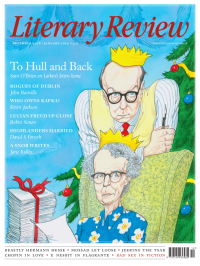Stuart Isacoff
Life in a Minor Key
Fryderyk Chopin: A Life and Times
By Alan Walker
Faber & Faber 727pp £30
Two centuries after his birth, Fryderyk Chopin remains a puzzle. Heralded for his piano playing, he nevertheless dreaded the stage. Although shy and assiduously proper, he engaged in a very public affair with the notorious cigar-smoking, cross-dressing George Sand. His supremely lyrical gifts (tapped successfully by 20th-century pop composers in songs such as ‘I’m Always Chasing Rainbows’) were tempered by a classical restraint. Yet his conceptions often rested on an experimental harmonic sensibility that might easily have relegated him to the artistic outer fringes. His musical voice, though suffused with a Polish accent and spirit, found nearly universal acclaim.
His influence on later composers is incalculable: Scriabin, Prokofiev, Fauré and Ravel all succumbed to it; the title page of Debussy’s Twelve Studies includes a dedication ‘to the memory of Frédéric Chopin’. Robert Schumann described Chopin’s sound as ‘cannons buried in flowers’. The Polish pianist Piotr Anderszewski finds in Chopin ‘the Slavic soul in all its breadth and depth, its generosity, the expression of a whole continent extended eastward, all dressed up in an impeccably tailored French suit … Perfectly cut. European. Western. But what screams and wailing are stifled within!’
Any biography of Chopin must search for the origins of these contradictory strains and account for the complexity of his character. Numerous authors over the years have focused on small slices of his life and career: Chopin at the Boundaries by Jeffrey Kallberg contextualises Chopin’s output in the

Sign Up to our newsletter
Receive free articles, highlights from the archive, news, details of prizes, and much more.@Lit_Review
Follow Literary Review on Twitter
Twitter Feed
It wasn’t until 1825 that Pepys’s diary became available for the first time. How it was eventually decrypted and published is a story of subterfuge and duplicity.
Kate Loveman tells the tale.
Kate Loveman - Publishing Pepys
Kate Loveman: Publishing Pepys
literaryreview.co.uk
Arthur Christopher Benson was a pillar of the Edwardian establishment. He was supremely well connected. As his newly published diaries reveal, he was also riotously indiscreet.
Piers Brendon compares Benson’s journals to others from the 20th century.
Piers Brendon - Land of Dopes & Tories
Piers Brendon: Land of Dopes & Tories - The Benson Diaries: Selections from the Diary of Arthur Christopher Benson by Eamon Duffy & Ronald Hyam (edd)
literaryreview.co.uk
Of the siblings Gwen and Augustus John, it is Augustus who has commanded most attention from collectors and connoisseurs.
Was he really the finer artist, asks Tanya Harrod, or is it time Gwen emerged from her brother’s shadow?
Tanya Harrod - Cut from the Same Canvas
Tanya Harrod: Cut from the Same Canvas - Artists, Siblings, Visionaries: The Lives and Loves of Gwen and Augustus John by Judith Mackrell
literaryreview.co.uk